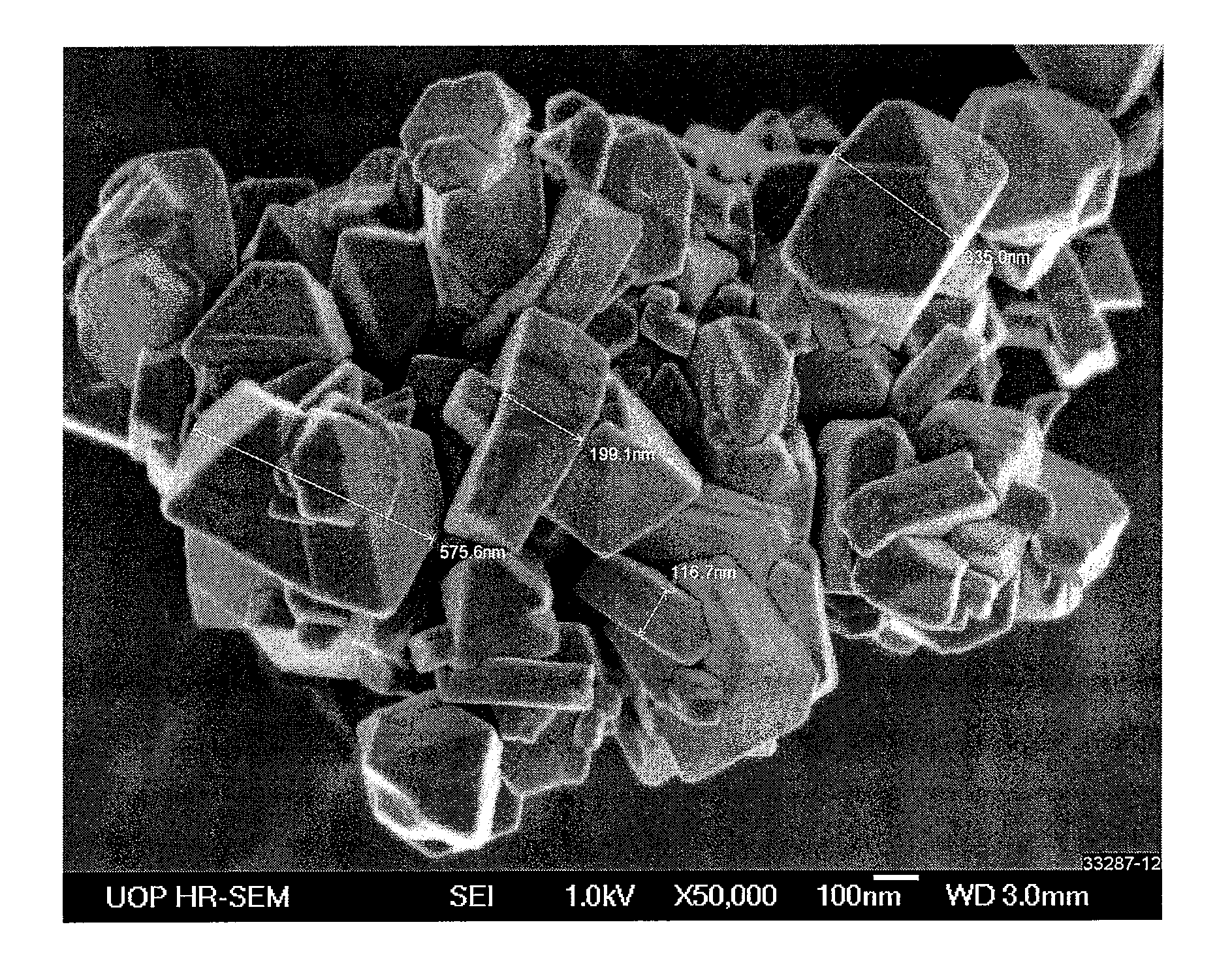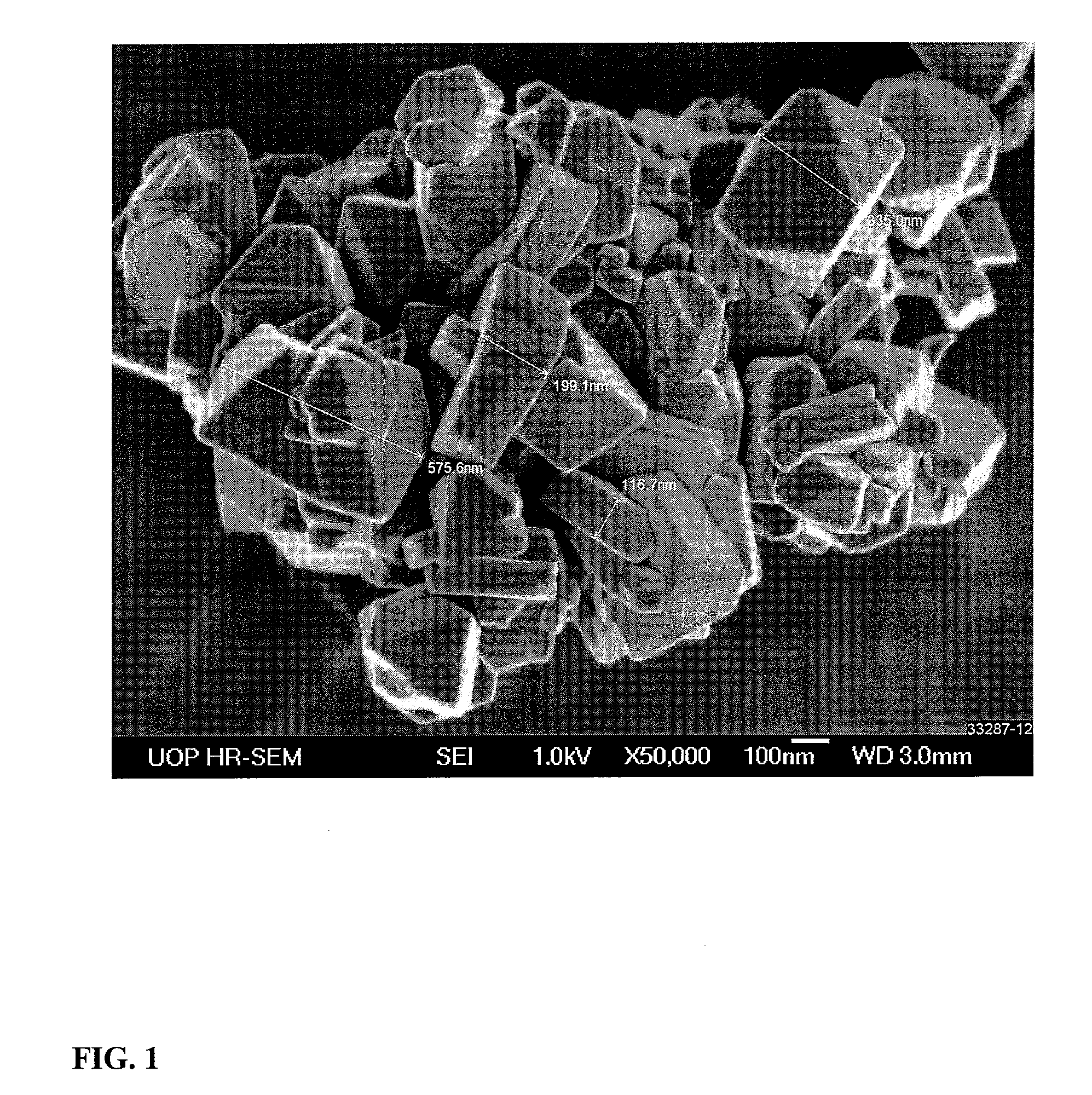Adsorbent and process for the separation of meta-xylene from aromatic hydrocarbons
- Summary
- Abstract
- Description
- Claims
- Application Information
AI Technical Summary
Benefits of technology
Problems solved by technology
Method used
Image
Examples
example 1
Synthesis of Nano-Size Zeolite Y
[0072]A container containing 1784 g of a 50 wt-% NaOH solution was heated and to it there were added 313 g of gibbsite alumina. The container was removed from the heat and to it there were added 2206.6 g of deionized water (DI-H2O) and the sodium aluminate solution cooled to room temperature. In a separate container, 2206.6 g of DI-H2O was added to 6604 g of sodium silicate and while stirring the sodium aluminate solution was added. The resultant initiator was aged overnight at 50° C. The initiator had an empirical formula of:
Al2O3:16SiO2:16Na2O:238H2O
[0073]A reaction solution was prepared by mixing tetraethylorthosilicate (TEOS) with aluminum tri-sec-butoxide and diethyldimethylammonium (DEDMA) hydroxide to provide a reaction solution having an empirical formula of:
Al2O3:10.26SiO2:2.74(DEDMA)2O:230H2O
[0074]The initiator was slowly added to the reaction solution with stirring. The resultant reaction mixture was stirred, transferred to an autoclave whe...
example 2
Preparation of Nano Sodium Zeolite Y by Ion Exchange
[0075]The nano-size zeolite Y sample prepared in Example 1, and having ammonium ion exchanged sites, was subjected to ion exchange with sodium ions at a target exchange rate of 1 gram NaCl per gram of zeolite Y, using a 6 wt-% NaCl solution.
[0076]In a 2 liter glass beaker, 35 grams of NaCl was dissolved in 548.3 grams of DI-H2O to prepare a sodium ion exchange solution. A 35 gram sample of the nano-size zeolite Y was added to this solution while maintaining mixing on a stir / hot plate. The temperature of the resulting slurry was increased to 75° C. and held for 1-1½ hours with continual mixing. The beaker containing the slurry was then removed from the stir / hot plate, and the slurry was filtered using a Buchner Funnel apparatus with filter paper. The collected filter cake was washed with 1 liter of DI-H2O. The washed filter cake was added to a fresh preparation of sodium ion exchange solution (6 wt-% NaCl), as described above to aga...
example 3
Preparation of Adsorbent Containing Nano Sodium Zeolite Y
[0078]A laboratory muller was charged with 86.5 grams of the nano sodium zeolite Y, prepared as described in Example 2. An 8.1 gram portion of minugel clay binder, together with 1.5 grams of crystalline methylcellulose and 2.5 grams DISPEX™ N-40, were also added to the muller. These dry ingredients were mixed in the muller for 20 minutes. A 35.6 gram portion of water was added to the muller, and mixing was continued for 30 minutes. A few grams of water were additionally added to obtain a readily extrudable dough. The dough was then extruded through 0.063″ diameter dies with a piston extruder. The formed extrudates were dried at 100° C. for 2 hours. The dried extrudates were calcined by heating to 300° C. in one hour, holding at 300° C. for one hour, heating to 550° C. in one hour, and holding at 550° C. for 2 hours.
PUM
| Property | Measurement | Unit |
|---|---|---|
| Temperature | aaaaa | aaaaa |
| Temperature | aaaaa | aaaaa |
| Fraction | aaaaa | aaaaa |
Abstract
Description
Claims
Application Information
 Login to View More
Login to View More - R&D
- Intellectual Property
- Life Sciences
- Materials
- Tech Scout
- Unparalleled Data Quality
- Higher Quality Content
- 60% Fewer Hallucinations
Browse by: Latest US Patents, China's latest patents, Technical Efficacy Thesaurus, Application Domain, Technology Topic, Popular Technical Reports.
© 2025 PatSnap. All rights reserved.Legal|Privacy policy|Modern Slavery Act Transparency Statement|Sitemap|About US| Contact US: help@patsnap.com


